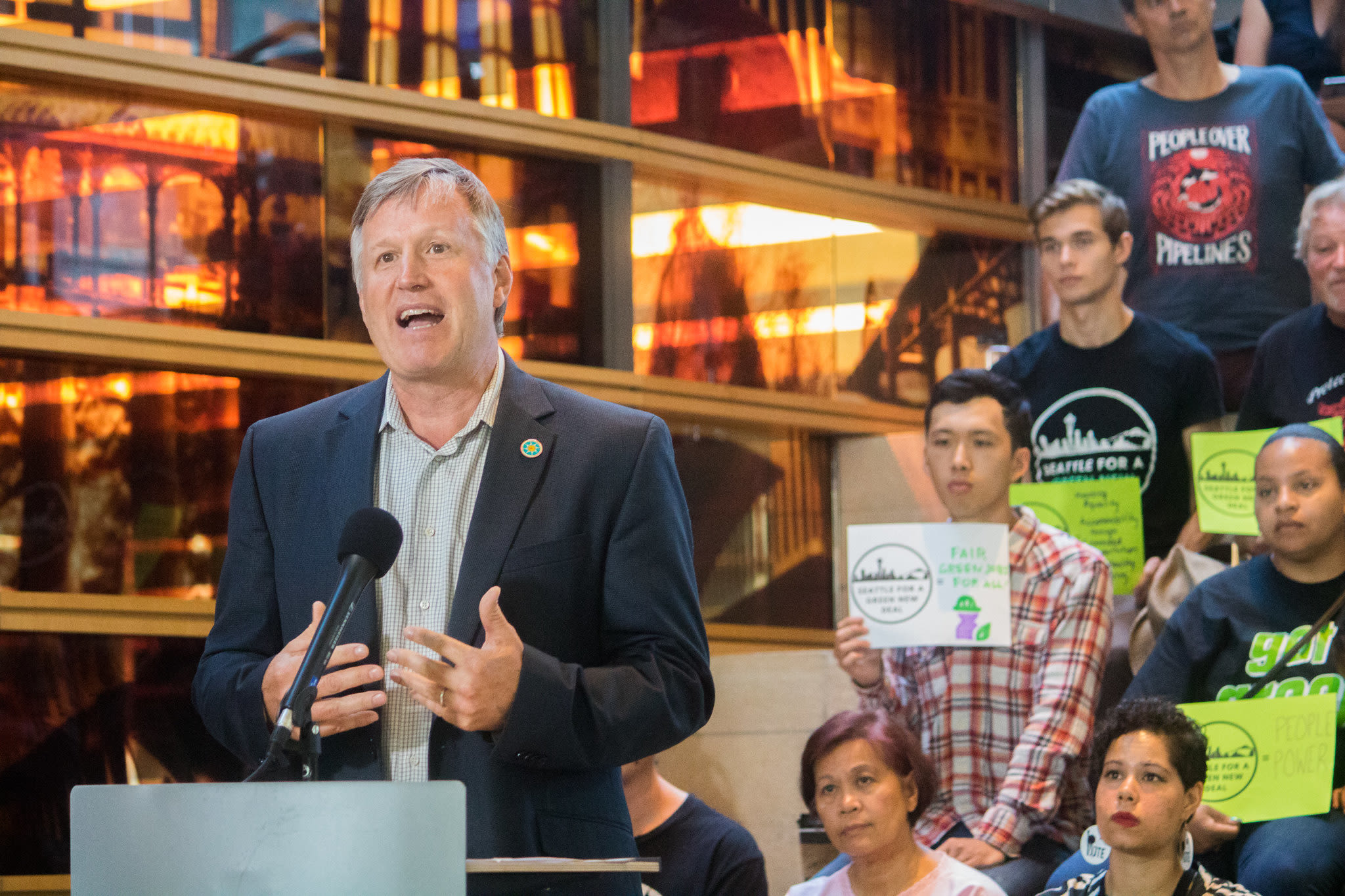City Hall
Council Still Skeptical of McGinn's Seawall Plans

Mayor Mike McGinn briefed a skeptical city council this morning on his proposal to put a $241 million bond measure on the May ballot to replace the waterfront seawall. Brandishing a poll by unofficial (see below ) mayoral advisor Chris Bushnell showing 70 percent support for his proposal, McGinn urged council members to put his measure on the ballot now.
However, McGinn allowed that the poll did not include the average cost to taxpayers—$48 a year for the owner of a typical home. And he acknowledged that his proposal would only move up construction by about a year from the planning already underway at the city, at a additional cost of about $3 million (plus $1 million for a special May election).
Council members, already angered by McGinn's decision to move forward with the proposal (which must be approved by the council) without informing them of his plans, fired tough questions about McGinn's motivation for moving forward with an entirely city-funded seawall measure now, when a city-appointed work group has been working on the seawall as part of a comprehensive waterfront planning process for months. That work is expected to wrap up later this year. Only Mike O'Brien, a tunnel opponent like McGinn, did not ask any questions.
"I am concerned about doing whatever we do in a comprehensive manner," council member Sally Bagshaw told McGinn. "[The state department of transportation] has been calling this the Alaskan Way Viaduct and seawall project. I don’t want to go this alone. ... If we ask the citizens of Seattle … to take on the burden of replacing the seawall alone…. That strikes me as not being a comprehensive and thoughtful process."
Council members suggested that the city might seek money from the Port of Seattle or the Army Corps of Engineers as well as city taxpayers. McGinn, however, said that based on informal conversations he'd held with the Port and the Corps, "the odds of getting money" from either agency "are low."
Bagshaw, a tunnel fan and onetime chair of Allied Arts' pro-tunnel Waterfront for All committee, also pointed out that she has been working with Seattle Department of Transportation viaduct project director Bob Chandler on waterfront planning for years. "Why now, and why in May?" she asked.
"I have worked for years to move the waterfront project forward. That included the seawall and now the [downtown] tunnel," Bagshaw continued. "I feel like, frankly that I’m still fighting with you about whether we’re going forward with the tunnel."
McGinn, bristling visibly, responded: "The issue of 'why now' is that the seawall is a safety risk and we have known that for nine years and have not acted. ... I have not heard in the last nine years that anyone has said the seawall is a public safety risk." He said that after watching a "horrifying" video released by the state transportation department last October, he realized that fixing the seawall was urgent.
"I've worked for a long time in the city of Seattle. We do indeed have a difference of opinion on the tunnel, but that disagreement should not stop us from fixing a public safety risk now."
Council member Tim Burgess took strong exception to the charge that the city hadn't taken action on the seawall.
"You've characterized it as, we have not done anything" about the seawall, Burgess said "I think we've done a lot. Our existing plan calls for the seawall to be replaced by the end of 2015. ... To characterize the city's work as 'basically no response to the seawall,' I think, is incorrect."
Council members also questioned whether McGinn's polling was an accurate reflection of voter opinion. The poll, which McGinn said he paid for "out of my personal checkbook," asked 1,001 likely voters whether they would approve a levy of 12 cents per thousand dollars of property value; 70 percent said yes. I've got a call in to McGinn's consultant, Bill Broadhead, to find out more details about the poll, including how much it cost; the phone number at Bushnell's firm, Constituent Dynamics, is not in service.
The council did seem open to the idea of going to the ballot in August instead of May, which would save money (because the measure would share the ballot with the 2010 primary) and give council members more time to vet McGinn's proposal.
Filed under
Share
Show Comments




